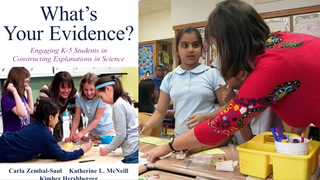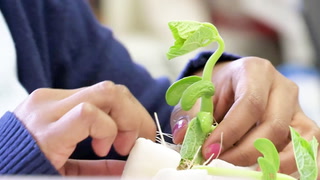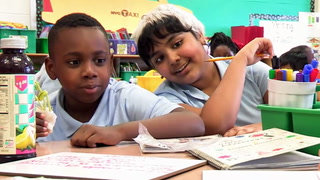Claims, Evidence, & Reasoning: Lesson Transcript
Speaker 1: Before we do anything else, I'm going to give you your bean.
Speaker 2: Oh, wow!
Speaker 1: Even changes from yesterday. Bathroom beans. We will be talking about our investigation, talking about our observation, so you're gonna need your bean in front of you.
Alrighty, so everyone has their bean, right?
Children: Yes.
[00:00:30]
Speaker 1:
Okay, cool. Today we're gonna focus on our claim, which is our answer to our question. What is our focus question for today?
Ama: What do kidney beans need to successfully germinate?
Speaker 1: What I wanted the students to do was to define the word "germinate" so that we could build from one small concept up to understanding a full question.
Think about our investigations and how that can push you to get a really good definition of the word "germinate."
[00:01:00]
Speaker 4:
I think "germinate" is another way to say "grow" or "sprout."
Kenneth: I think it means to grow a couple of roots and a stem so that it could at least pop out of the surface it's in a little bit.
Devon: My bean, I think it germinated and it also changed color.
Speaker 1: So do you think that changing color was part of the germinating? So, explain how it changed color, though. How did it start out?
[00:01:30]
Devon:
It started out as...
Speaker 1: It's hard I think when you first start to teach this way, to not immediately correct them because I think it's important for them to come to it themselves, and for the students to kind of encourage each other.
Lidia: Mine has a lot of sunlight cause it's on the bookshelf. That's why it's so green, and look at Kenneth's. It's so yellow.
Kenneth: And look at my leaves.
Lidia: Your leaves are... [crosstalk 00:01:51]
Kenneth: Look at my roots.
Lidia: Germination means to change the color and grow. [crosstalk 00:01:56] Sprout and grow.
[00:02:00]
Speaker 1:
There was some confusion
Lidia: No, no the lifecycle.
Speaker 1: They were just going from germination straight to the whole life cycle of the bean, which for me was frustrating but to Kimber it was something great to work from.
Lidia: What do you think? [crosstalk 00:02:13]
Kenneth: ... to keep the life cycle ...
Lidia: No.
Speaker 1: When you're asking students to actually write out what they've learned and then connect that to evidence, it's a process that I think we haven't always had students go through.
[00:02:30] As a teacher you have a set way that you think it's supposed to be and then it doesn't turn out that way, but it was for the best.
There's some confusion thinking what germination is compared to the entire life cycle of the bean. How many of your groups had something about the life cycle or the completed life cycle in your definition?
Do you feel like it should be there? Nakita, what do you think about that?
[00:03:00]
Nakita:
I think it shouldn't be there because my bean didn't complete its life cycle and on the day it first has its growth it didn't complete it either.
Speaker 1: So what day was that?
Nakita: Day three.
Speaker 1: Which specific stage in your diagram do you think the germinating is happening?
Nakita: In the second one.
Speaker 1: In the second one. Why?
Nakita: ... because it starts to grow its roots.
Speaker 1: It starts to grow its roots, okay.
[00:03:30] It is the start. It's taking its first steps to grow. I'm goin to take down what everybody said and then tomorrow I'm going to write it down on our clues chart, and you guys can let me know if you think it's good or not. Okay?
How do we feel about that?
Children: Good, alright.
Speaker 1: Good. Yesterday we were talking about diagrams. You guys did a diagram of an open bean. See, some of them I blew up and put them over here so we can have them for our evidence when we are talking about our reasoning.
[00:04:00] What we're going to do next is we are going to answer our question, which is going to be our claim. Okay, so the answer to our question, what do kidney beans need to germinate? Is our claim. You're each going to get a yellow piece of paper that you are going to jot down based on what we did and what we saw, what we think the answer to this is. But remember, based on our data and then as a group you are going to come up with a claim to the question. You guys are going to make a poster.
[00:04:30] The next task they were doing was writing their claim, the answer to their question and the evidence that goes along with that.
Kenneth: It doesn't need the sun.
Speaker 4: That's after, that's after it's germinating.
Kenneth: Just stop.
Speaker 4: That's when it need sun.
Kenneth: When it has the little tiny hipicot, that's when it needs the sunlight.
Children: [crosstalk 00:04:42]
Speaker 1: They were being argumentative in a great way and again, they were saying things I was not expecting, but it was really great facilitating their discussions.
We saw what about the ones in the closet?
Children: [crosstalk 00:05:01]
[00:05:00]
Speaker 1:
Didn't need sunlight. Right?
Not even the stretching yet because that's for what? Is that for germinating or ... that's for thriving, so we're not even talking about that yet. But for germinating, did Kenneth's bean, where yours in the cupboard, did it need sunlight?
Children: No.
Speaker 1: If they can take that misconception and go with it and then figure out why then that is its own teaching tool, and I just have to learn to just roll with it because it worked.
[00:05:30] Think about everything you talked about as a group and think about what should go down on this paper.
Lidia: So, we're going to read ours, which answers we want on the chart.
Speaker 2: We need to find more evidence for this cause our only claim was water.
Speaker 1: Were there any beans that didn't have water?
Children: Yes, some, [crosstalk 00:05:52]
Speaker 1: Devon A and Aditcha. So that can prove what?
[00:06:00]
Lidia:
It needed water because two beans was dry and nothing happened to it.
Speaker 1: This is really putting it in to their own language and their own words. It helps students to learn but I also think it helps us to be a teacher that's more in tune to listening.
Lidia: They need water because ... Devon A tried it without water, and they did not grow.
Speaker 1: What's our word? They didn't ...
Lidia: Germinate.
Speaker 1: Okay peeps, we're at the final stretch.
[00:06:30] You are going to read your poster and everybody needs to be really, really listening so that we can comment and see what we think about what everybody wrote.
You want to go first? Go ahead.
Kenneth: ... kidney beans need stored food from the dystopy, water nutrients, and love to successfully germinate. Also, sunlight, but it's optional.
Speaker 1: Kenneth's was in the closet. Did Kenneth's plant need sunlight to start germinating? So, should we say that the sunlight is optional?
[00:07:00]
Kenneth:
It's kind of optional because it, sunlight is just making more nutrients for the plant to grow.
Speaker 1: For germination, or for what other process that we're going to talk about later?
Kenneth: Thriving.
Speaker 1: We're talking about germination right now. Lidia.
Lidia: They really don't need sunlight because they have their stored food and their water already and, already like, with them so they're good to go.
Speaker 1: Okay, anyone have thoughts on the soil claim?
[00:07:30]
Kenneth:
Seeds don't need soil because we did an experiment without soil and our seeds grew.
Speaker 1: Raise your hand if your bean germinated without soil. I would say that's a load of evidence, right?
So, were saying that they need, I'm hearing water, nutrients, stored food but what can we confidently say they do not need?
Devon.
Devon: They don't need sunlight and soil.
Speaker 1:
[00:08:00] So we found based on our evidence and our data that they do not need soil and sunlight. Kudos to you guys, that was great. Really, really proud of you. I'm going to collect your posters so that I can look over them.
Kay, thank you sir.














8 Comments
Ryan Cantrell Jul 27, 2020 8:51pm
I really like this way of teaching, as it helps the teacher see that the students are learning what is taught and helps the students reenforce the knowledge into their brains. A great way to debrief a complicated subject for children.
Kelsey Ballard Nov 15, 2019 2:12am
I love using the concept of "claims" and "evidence" for teaching science! Hearing students discuss how they needed more evidence for their claim shows high-level critical thinking about the scientific method.
Justine Marie N... Aug 26, 2019 10:18pm
Hello, everyone, my name is Justine and I am new in the group. I teach French in the Immersion school and I like what I watched on this video. my students are able to observe, to ask the question, and to explain results. but I feel like they don't explode their knowledge because I don't give them enough fact to build their logical explanation.
Your strategy is awesome, I think that it is important to give students the opportunity to build reasoning from very specific and realistic evidence. The concept of germination taught this way really help the students master the concept and understand the process of how and why plant germinate and grow.
Mary Bartz Feb 17, 2019 10:14pm
I miss not teaching science this year as I am teaching reading,writing and math in an Immersion program. I do feel looking at the plant day to day and recording what they see is very useful and shows understanding of how they germinate.
RANU BHAT Jan 11, 2018 11:37am